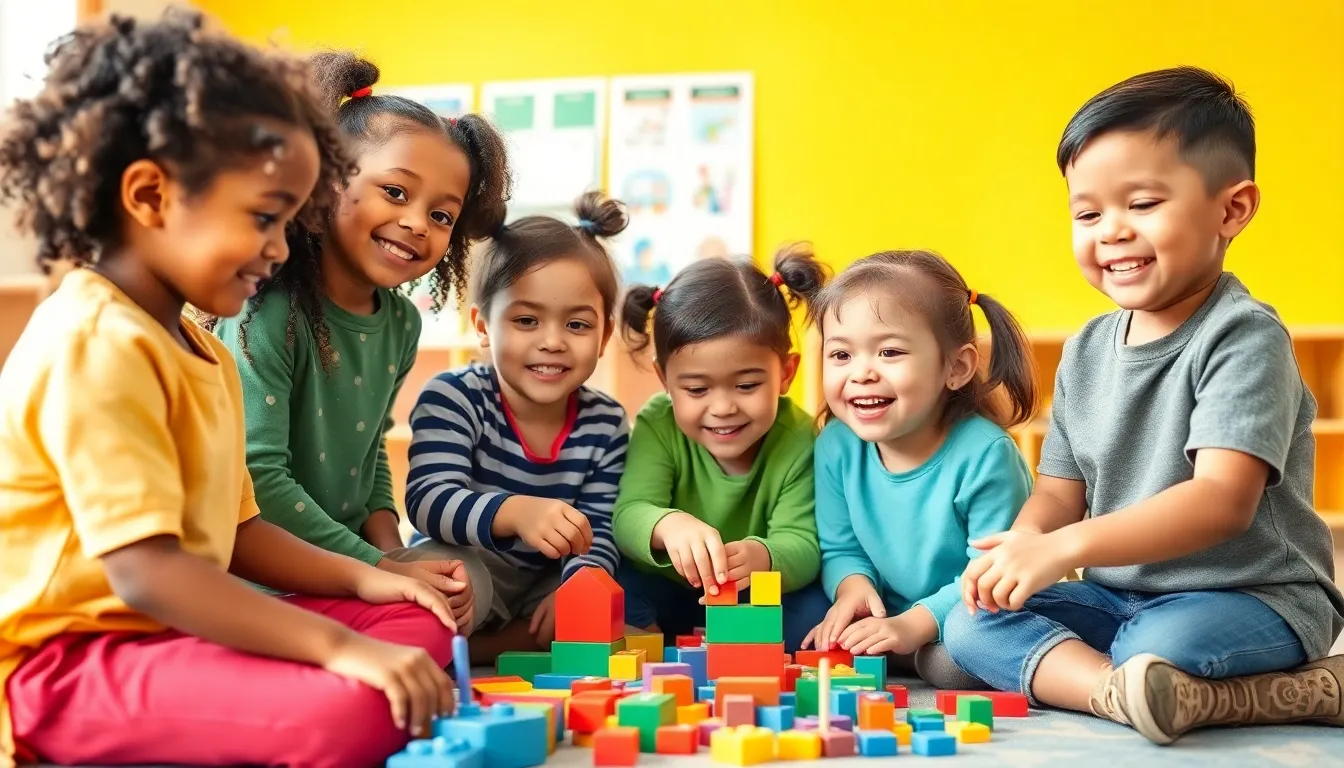Table of Contents
ToggleIn a world where tiny humans rule the playground and snack time is an Olympic sport, pursuing a Bachelor of Education in Early Childhood might just be the smartest move anyone can make. It’s not just a degree; it’s a passport to a vibrant career filled with giggles, crayons, and the occasional glitter explosion. Imagine shaping young minds while dodging flying toys—what could be more rewarding?
Early childhood educators are the unsung heroes of the education system. They lay the foundation for lifelong learning, all while mastering the art of storytelling and the science of nap time management. If you’re ready to dive into a world where every day is an adventure and your classroom is a stage, this degree could be your ticket to making a difference, one little heart at a time.
Overview of Bachelor of Education Early Childhood
A Bachelor of Education in Early Childhood equips individuals with the knowledge and skills necessary to nurture and educate young children. This degree emphasizes child development principles, allowing educators to understand cognitive, social, and emotional growth in early years. Programs typically combine theoretical coursework with practical experiences, fostering the ability to apply concepts in real classroom settings.
Core subjects within the curriculum include early childhood education theories, curriculum design, and assessment strategies. Candidates learn about inclusive practices that accommodate diverse learning styles and backgrounds. Classroom management techniques are also covered, preparing educators to create positive and engaging learning environments.
Furthermore, field experiences play a crucial role in the degree’s structure. Students participate in guided placements in various early childhood settings, gaining firsthand experience in teaching and interacting with children. This practical exposure enhances their confidence and effectiveness as educators.
Graduates often pursue careers in preschools, childcare centers, and early intervention programs. They may also collaborate with families to ensure each child’s developmental needs are met. The degree opens pathways to leadership roles and advanced studies in education.
Earning a Bachelor of Education in Early Childhood not only fosters essential teaching skills but also instills a deep commitment to child advocacy. This program cultivates passionate educators who are prepared to make a lasting impact on the lives of children and their families.
Importance of Early Childhood Education

Early childhood education plays a vital role in shaping children’s futures. It serves as the foundation for lifelong learning and personal development.
Cognitive Development in Early Years
Cognitive development during early years significantly influences a child’s future academic success. Children develop critical thinking and problem-solving skills through engaging activities and play. They explore concepts like numbers, letters, and shapes, fostering curiosity and creativity. Educators observe and assess these skills, ensuring children meet developmental milestones. Research shows early exposure to rich educational environments leads to better performance in later schooling. Cognitive growth during these stages lays the groundwork for effective learning strategies.
Social and Emotional Growth
Social and emotional growth occurs as children interact with their peers and caregivers. Through play and group activities, they learn crucial skills like sharing, empathy, and collaboration. These experiences help them navigate friendships and develop self-regulation. Children who experience supportive emotional environments show improved confidence and resilience. Early childhood educators facilitate this process by modeling appropriate behaviors and providing guidance. The ability to form positive relationships during early years enhances overall mental health and well-being.
Curriculum and Coursework
Curriculum and coursework for a Bachelor of Education in Early Childhood provide a solid foundation for aspiring educators. This program emphasizes a blend of theoretical knowledge and practical application.
Core Subjects in the Program
Core subjects guide students through essential concepts in early childhood education. Early childhood education theories cover developmental frameworks, informing teaching practices. Curriculum design courses teach how to create engaging lesson plans tailored for young children’s needs. Assessment strategies focus on evaluating children’s progress and adapting instruction accordingly. Inclusive practices explore how to support diverse learners, fostering an equitable environment. Lastly, classroom management techniques prepare educators to maintain order while encouraging creativity and exploration.
Specialization Opportunities
Specialization opportunities enable educators to focus on specific aspects of early childhood education. Options include working with children with special needs, which allows for targeted interventions and support. Additionally, courses in bilingual education equip educators to teach in multilingual settings, enhancing cultural competency. Montessori and other alternative education methods provide insights into different teaching philosophies and practices. Parent and community engagement courses emphasize developing strong relationships with families, supporting children’s learning at home. Each specialization enhances an educator’s skill set, ensuring they can meet diverse children’s needs effectively.
Career Opportunities for Graduates
Graduates of a Bachelor of Education in Early Childhood enjoy a range of fulfilling career opportunities. Early childhood education presents a dynamic field where educators play an essential role in shaping children’s futures.
Teaching Roles in Early Childhood
Teaching roles in early childhood encompass various settings like preschools and kindergartens. Classroom teachers foster creativity and critical thinking through engaging activities. Lead teachers design and implement age-appropriate curricula, catering not just to educational needs but also to emotional development.
Assistant teachers support lead educators in classroom management and instructional activities. Special education teachers ensure inclusive environments for children with diverse learning needs. Professionals often find additional opportunities in early intervention programs, focusing on developmental support during critical stages of childhood.
Other Related Professions
Many related professions exist for graduates of early childhood education programs. Childcare directors manage operations in daycare centers, overseeing staff and curriculum implementation. Education consultants collaborate with schools and organizations, providing expertise in curriculum development and instructional strategies.
Curriculum coordinators evaluate educational programs, emphasizing alignment with developmental standards. Family support specialists assist families in navigating resources and services for children’s learning needs. Moreover, advocates in child policy work towards enhancing educational opportunities and resources for young children nationwide.
Challenges in Early Childhood Education
Early childhood education faces several challenges that require effective strategies and approaches. Educators encounter unique obstacles that impact classroom dynamics and children’s learning experiences.
Classroom Management Strategies
Developing effective classroom management strategies is essential in early childhood education. Establishing clear rules fosters a structured environment, helping children understand expectations. Engaging activities keep children focused and promote active participation. Regularly incorporating routines creates a sense of stability, allowing children to thrive. Additionally, implementing positive reinforcement encourages desired behaviors, making learning more enjoyable.
Educators also benefit from ongoing professional development, which equips them with innovative techniques. Collaboration with colleagues sparks new ideas, ensuring strategies are tailored to specific classroom needs. Flexibility remains crucial, as educators adjust approaches based on children’s responses. Success in classroom management enhances the overall educational experience, paving the way for effective learning outcomes.
Addressing Diverse Learning Needs
Addressing diverse learning needs presents a significant challenge that requires targeted strategies. Recognizing each child’s unique strengths and weaknesses helps educators create personalized learning plans. Differentiated instruction allows for flexible teaching methods, catering to individual learning styles. Integration of various assessment tools enables educators to monitor progress and adjust instruction accordingly.
Inclusion of family input is invaluable, as parents provide insights into children’s needs and strengths. Implementing collaborative practices with specialists ensures comprehensive support for all learners. Regular training in cultural competence enhances educators’ ability to connect with diverse students. Commitment to meeting diverse learning needs fosters an inclusive environment, promoting growth and development for every child.
Pursuing a Bachelor of Education in Early Childhood offers a fulfilling career path that significantly impacts young lives. Educators equipped with this degree play a vital role in fostering children’s development and laying the groundwork for their future success. With a blend of theoretical knowledge and practical experience, graduates are prepared to navigate the complexities of early childhood education.
The diverse career opportunities available allow graduates to find their niche while advocating for children’s needs. By embracing creativity and employing effective teaching strategies, they contribute to a positive learning environment. As early childhood educators continue to shape the future, their commitment to nurturing young minds remains essential in building a brighter tomorrow.







